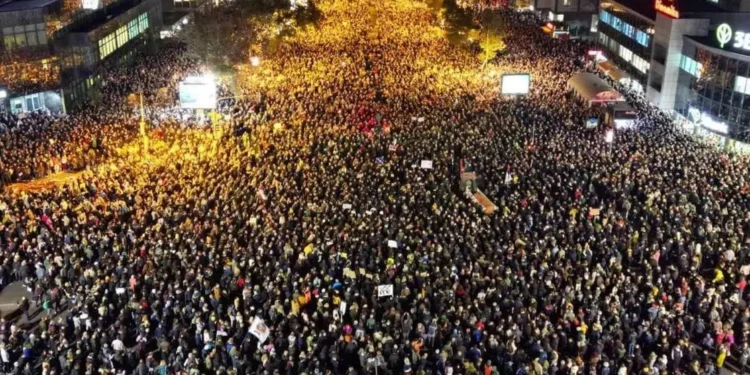“General strike” is a term that is being heard increasingly often and loudly at student protests, where university faculties across Serbia have been under blockade for two months.
On 20 January, thousands of people chanted the slogan at a joint gathering of some educators and students in central Belgrade.
On Wednesday, students involved in the blockade issued an official call for citizens to participate in a “general civil disobedience” on 24 January. This action would involve a complete halt to work and refraining from market transactions for the entire day.
Since 20 January, some school staff in Serbia have been on strike, demanding better working conditions and supporting the students’ demands for criminal and political accountability over the deaths of 15 people caused by the collapse of a shelter in Novi Sad on 1 November.
Legal experts point out that the existing Strike Law is imprecise in defining a general strike and that it is not aligned with international standards.
What is a general strike?
The Strike Law was adopted in 1996 during the era of the Federal Republic of Yugoslavia. It defines a strike as “a work stoppage organised by employees to protect their professional and economic interests arising from work.” According to the law, a strike can be organised within a company or legal entity, or in a sector or industry, including as a general strike.
“The decision to initiate a general strike is made by the highest body of the trade union. The decision to initiate a strike by employees in a sector, industry, or a general strike must be submitted to the relevant body of the employers’ association, the founder, and the competent state authority,” the law states.
These are the only provisions in the law that mention a general strike.
“This law is nearly 30 years old and has not been updated to align with new international standards. As a result, the concept of a general strike remains undefined,” Mario Reljanović, a research associate at the Institute for Labour Law in Belgrade, told Radio Free Europe (RSE).
In the theory of labour law, Reljanović explained, a general strike is understood as a cessation of work across various sectors and industries, in both public and private sectors, aimed at highlighting dissatisfaction with certain policies, legal solutions, practices, and similar issues.
“The essence of the term ‘general strike’ is that it does not refer to a single employer or sector but calls on the entire working population of the country to stop working. Our Strike Law primarily regulates strikes within individual employers. That is its major flaw,” Reljanović said.
The ambiguities in the law that should regulate this area leave many questions unanswered. One such question is who is authorised to decide on initiating a general strike.
“The law states that the decision to initiate a general strike is made by the highest body of the trade union, but it does not specify which union is meant—whether it refers to representative unions, or what happens if there are multiple representative unions and whether they must act together or if each can independently call for a general strike,” said Reljanović.
It is especially unclear, he added, what happens if there is no call from a trade union for a general strike, but it instead emerges from a broader social movement, as is currently the case in Serbia.
Who is calling for the strike?
Students involved in the blockade called on Serbian citizens on Wednesday to halt all activities on 24 January. In a statement published on their official Instagram page, they outlined their idea for citizens not to go to work that day and for employers to give their employees “a day off, cancel all scheduled meetings, and inform clients of the reasons for the closure.”
For employees afraid of their employer’s reaction, the students advised them to “take a day off, call in sick, or donate blood.”
The students also urged citizens to avoid restaurants, shops, and all other places where financial transactions occur on Friday.
“Don’t go to shops, markets, shopping malls, cinemas, or theatres. It’s Friday, but don’t attend parties or concerts. Everything must stop,” the statement said.
The students in the blockade are demanding the publication of all documentation on the reconstruction of the Novi Sad Railway Station, where the shelter collapsed, the dismissal of criminal charges against students and citizens who were arrested and detained during protests, and the halting of ongoing criminal proceedings.
Other demands include the prosecution of individuals responsible for attacks on students and professors, their removal from public office if found to hold such positions, and a 20% increase in the budget for higher education.
Some educators have joined these demands, refusing to start the second semester on 20 January. They reject the agreement on salary increases reached earlier this month between the Serbian government and representatives of four representative unions.
According to the Independent Union of Serbian Educators, which did not participate in the negotiations, 50% of schools across Serbia were on strike on Monday, 20 January.
On the other hand, government representatives claimed that only 20% of schools were on strike on the first day of the second semester.
‘The legal undermining of strikes’
In addition to being unclear in its definition and regulation of general strikes, the Strike Law broadly includes sectors required to maintain a minimum level of work processes.
Beyond those essential for daily functioning, such as healthcare, police, fire services, or the power industry, the law also includes sectors that, according to the International Labour Organisation (ILO), should not be subject to such restrictions.
“Our Strike Law does not allow the education sector to fully halt work, which is in direct contradiction to international standards that the International Labour Organisation has developed and regularly published over decades,” said Mario Reljanović, an expert in labour law.
(Radio Free Europe, 23.01.2025)
https://chatgpt.com/g/g-5bNPpaVZy-translate-gpt/c/67920b15-7f28-8006-9608-f92c34fe0784
Source link : http://www.bing.com/news/apiclick.aspx?ref=FexRss&aid=&tid=67934c0ca0234b0fbfd6a0bd6b4d950f&url=https%3A%2F%2Fwww.serbianmonitor.com%2Fen%2Fgeneral-strike-in-serbia-what-does-the-law-say%2F&c=11572627667134674292&mkt=de-de
Author :
Publish date : 2025-01-23 01:38:00
Copyright for syndicated content belongs to the linked Source.


